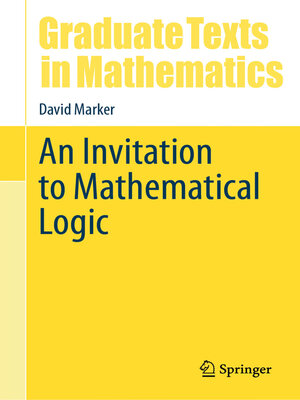
Sign up to save your library
With an OverDrive account, you can save your favorite libraries for at-a-glance information about availability. Find out more about OverDrive accounts.
Find this title in Libby, the library reading app by OverDrive.



Search for a digital library with this title
Title found at these libraries:
| Library Name | Distance |
|---|---|
| Loading... |
In addition to covering the essentials, the author's intention in writing this text is to entice the reader to further study mathematical logic. There is no current "standard text" for a first graduate course in mathematical logic and this book will fill that gap. While there is more material than could be covered in a traditional one semester course, an instructor can cover the basics and still have the flexibility to choose several weeks' worth of interesting advanced topics that have been introduced. The text can and will be used by people in various courses with different sorts of perspectives. This versatility is one of the many appealing aspects of this book. A list of suggested portions to be covered in a single course is provided as well as a useful chart which maps chapter dependencies. Additionally, a motivated student will have ample material for further reading.
New definitions, formalism, and syntax have been streamlined to engage thereader quickly into the heart of logic and to more sophisticated topics. Part I and Part IV center on foundational questions, while Part III establishes the fundamentals of computability. Part II develops model theory, highlighting the model theory of the fields of real and complex numbers. The interplay between logic and other areas of mathematics, notably algebra, number theory, and combinatorics, are illustrated in Chapters 5, 6, 8, 14, and 16. For most of the text, the only prerequisite is mathematical maturity. The material should be accessible to first year graduate students or advanced undergraduates in mathematics, graduate students in philosophy with a solid math background, or students in computer science who want a mathematical introduction to logic. Prior exposure to logic is helpful but not assumed.







